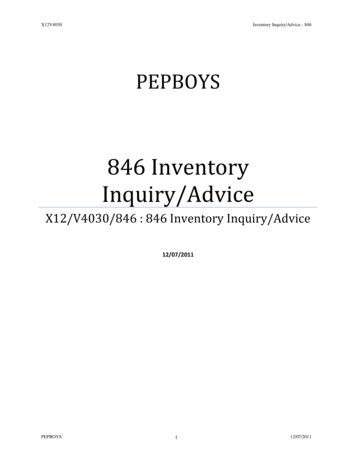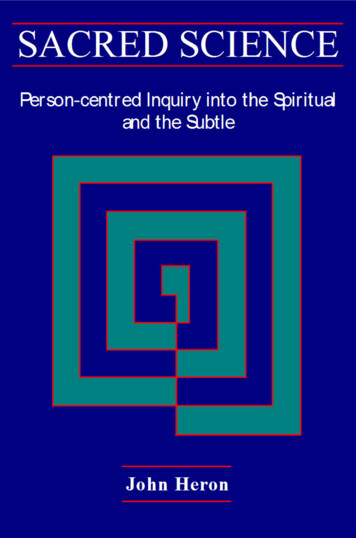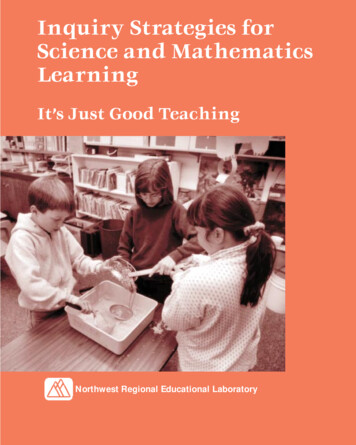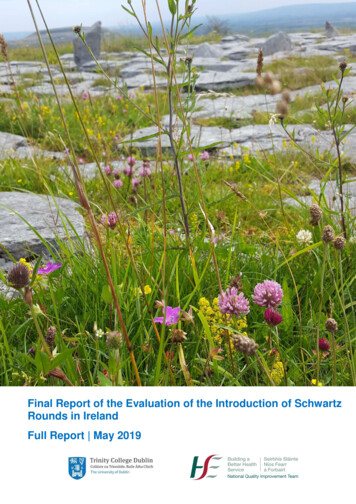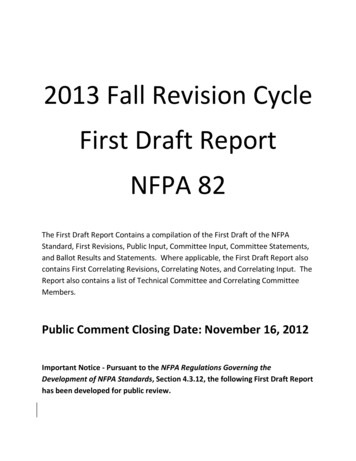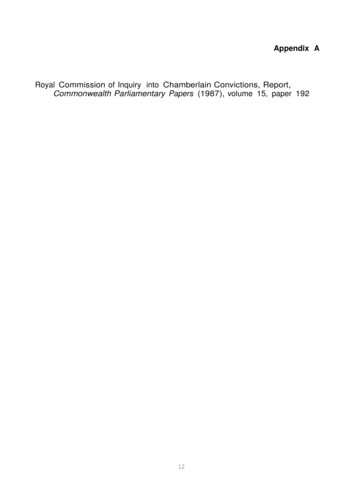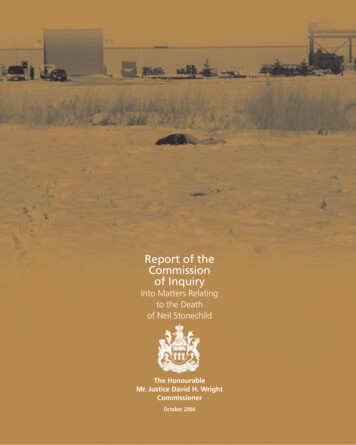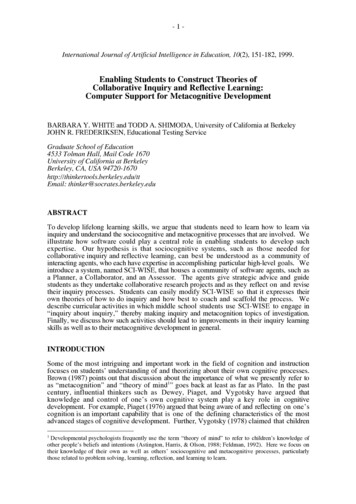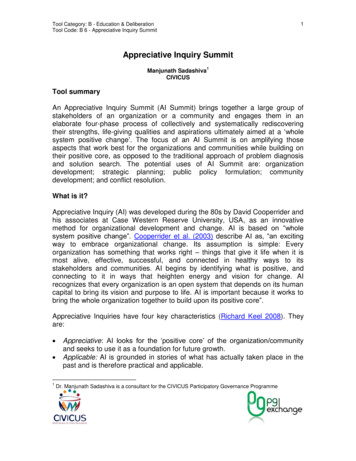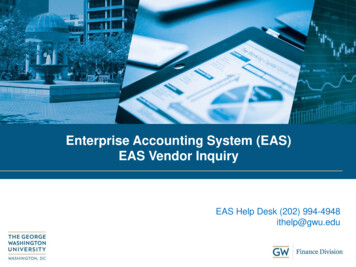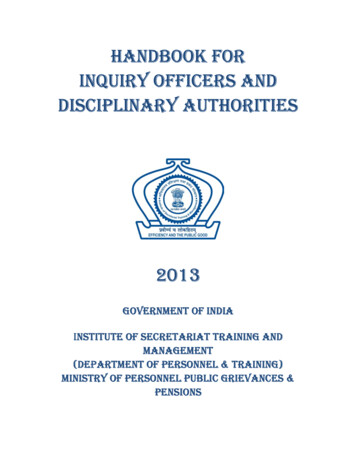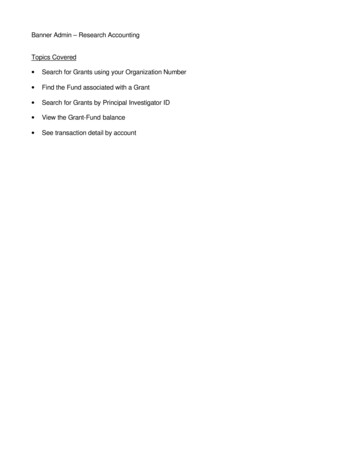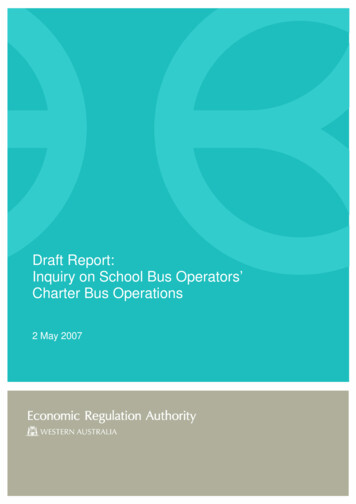
Transcription
Draft Report:Inquiry on School Bus Operators’Charter Bus Operations2 May 2007
A full copy of this document is available from the Economic Regulation Authority web site atwww.era.wa.gov.au.For further information, contact:Economic Regulation AuthorityPerth, Western AustraliaPhone: (08) 9213 1900 Economic Regulation Authority 2007The copying of this document in whole or part for non-commercial purposes is permittedprovided that appropriate acknowledgment is made of the Economic Regulation Authorityand the State of Western Australia. Any other copying of this document is not permittedwithout the express written consent of the Authority.
Economic Regulation AuthorityForewordThe State Government of Western Australia has requested the Economic RegulationAuthority (Authority) to undertake an inquiry into school bus operators’ charter busoperations.In accordance with the Terms of Reference, the Authority will examine and report on: the impact that the participation by school bus contractors in the commercial buscharter industry has on competition, prices and pricing policy, investment andbusiness practices, and service quality and reliability in the industry; the revenues and costs of school bus contractors under their contracts with thePublic Transport Authority; and whether, and how, the service charge model in the school bus service contractscould be amended to remedy any competitive unfairness which might arise fromthe participation by school bus contractors in the commercial bus charter industry.The Authority’s evaluation will inform Government and contribute to the existing reviewprocesses for school bus service contracts within the Public Transport Authority.This Draft Report presents the initial views of the Authority, and the reasoning behindthose views, on the issues in the Terms of Reference. It is intended to facilitate publiccomment and debate.Submissions on any matters raised in this Draft Report or in response to any matters inthe Terms of Reference must be received by 4.00 pm Thursday 31 May 2007 WST andshould be in written and electronic form (where possible) and addressed to:Inquiry on School Bus Operators’ Charter Bus OperationsEconomic Regulation AuthorityPO Box 8469Perth Business CentrePERTH WA 6849Email: schoolbuses@era.wa.gov.auFax: (08) 9213 1999Section 1.4 of this Draft Report provides further information regarding the process formaking a submission.The Final Report for the inquiry was originally scheduled to be delivered to the StateGovernment by 31 May 2007. However, the Authority will be applying to the Treasurer tohave the final reporting date deferred until 29 June 2007 to allow sufficient time for publicconsultation on the Draft Report. Following receipt of the Final Report, the Governmentwill have 28 days to table the report in Parliament.I encourage interested parties to consider the Terms of Reference and the matters raisedin this Draft Report and prepare a submission to the inquiry.LYNDON ROWECHAIRMANInquiry on School Bus Operators’ Charter Bus Operations: Draft Reporti
Economic Regulation AuthorityContentsForewordiContentsiiList of TablesiiiPreliminary Views1Introduction1.1 Terms of Reference1.2 Background to the Inquiry1.3 Review Process1.4 How to Make a Submission334452How Do School Bus Contracts Work?2.1 History of School Bus Contracts2.1.1Past Reviews2.1.2Contract Tenure2.2 Composite Rate Model (CRM)777893Impact of School Bus Operators on the Commercial Bus Charter Industry3.1 Terms of Reference3.2 Services Provided by School Bus Operators3.3 Competition in the Commercial Charter Industry3.3.1Issues Raised in Submissions3.3.2Authority Assessment3.4 Prices and Pricing Policy for Services3.4.1Issues Raised in Submissions3.4.2Authority Assessment3.5 Investment and Business Practices in the Industry3.6 Quality and Reliability of Services3.6.1Issues Raised in Submissions3.6.2Authority Assessment3.7 Summary11111112121414151617171819204Financial Remuneration of School Bus Contractors4.1 Terms of Reference4.2 Revenue Required to Provide School Bus Services4.2.1Return on Capital4.2.2Depreciation4.2.3Operating and Maintenance Expenditure4.2.4Overall Assessment4.2.5Adjusting Revenues for Charter Work2121212227282930Appendices33Appendix 1: Terms of Reference34Appendix 2: Composite Rate Model (CRM) Parameters35iiInquiry on School Bus Operators’ Charter Bus Operations: Draft Report
Economic Regulation AuthorityList of TablesTable A2.1 School Bus Classes and Class Bus Prices for 200635Table A2.2 Composite Rate Model (CRM) Cost Components36Inquiry on School Bus Operators’ Charter Bus Operations: Draft Reportiii
Economic Regulation AuthorityPreliminary Views1)It appears that only a small percentage of school bus contractors engage infrequent commercial charter work.2)The indications to date suggest that any impacts of school bus operators oncompetition in the charter industry are likely to be highly localised, and limited tosituations where: the commercial charter work is outside the school hours covered by theschool bus contracts; and there is sufficient charter work in a region to sustain more than one operator,but not where there is a shortage of buses to meet demand.3)Any changes to the remuneration model for school bus operators will need totake into account impacts on charter services for schools and communityorganisations.4)While school bus operators do often provide charter services to schools andcommunity organisations at variable cost, the practice of setting prices to covervariable costs alone encourages the utilisation of the school bus fleet outsideschool hours.5)While the question of how the fixed costs of school buses are apportionedbetween government and school bus charter customers is matter for governmentsocial policy, the Authority is of the view that any change to the existing costallocation is unlikely to be justified on the basis that the costs of such changesare likely to exceed the benefits.6)There is no indication from submissions that investment and/or service standardsin the charter bus industry are adversely affected by the participation of schoolbus operators in the commercial charter bus industry.7)The information currently available to the Authority suggests that: commercial charter buses require higher service standards than thoseallowed for under the school bus contracts; and that school bus operators who actively engage in commercial work often makeadditional investments in their buses, not covered by the CRM, to bring themup to the standards required for charter work.8)Whether or not additional capital expenditure on school buses is treated as partof the asset value will depend on whether that expenditure is deemed under theschool bus contract to be necessary to meet the service standards in thecontract, which is a matter outside the Terms of Reference for this inquiry.9)It is likely that the risks facing school bus operators are less than the risks inother markets. This would imply that an appropriate real pre-tax rate of return forschool bus operators is in the order of 8.6 per cent.10)On the basis that the return on and of assets other than the school bus itself (e.g.garaging) are adequately provided for as part of operating expenditure, theappropriate asset value to which a rate of return is applied is the depreciatedvalue of the school bus.11)The determination of depreciation in the CRM through straight line depreciationInquiry on School Bus Operators’ Charter Bus Operations: Draft Report1
Economic Regulation Authorityover the life of the asset and allowing for a residual value at the end of the assetlife is consistent with a standard regulatory approach to depreciation.12)As an average cost model, the CRM will disadvantage some contractors on somecost parameters and advantage others. However, whether the average valuesfor each cost component are set at the right level is a matter to be resolvedthrough the periodic reviews of CRM components rather than in this inquiry.13)As each CRM cost component is reviewed every three years, these costs arelikely to be close to estimated efficient costs.14)The CRM generates revenue in excess of the costs that are specified in theCRM. However, the Authority is reluctant at this stage to conclude that thehigher revenue could be impacting on competition in the charter industry becausethe Authority has not had sufficient time to confirm that the CRM makes sufficientallowance for all of the costs associated with a school bus contract (e.g. the CRMdoes not appear to allow for a management fee). In addition, school buscontractors have no incentive to charge less than variable cost and the Authorityis not aware of any situations where this has actually occurred.15)On the evidence available, the Authority considers that there are likely to be fewnet benefits to the State from introducing charter fees for charter workundertaken by school bus operators. Any impacts of school bus operators on the commercial bus industry arelikely to be highly localised and might be better addressed locally. A charter fee, if introduced, could have unintended impacts on localcommunities, including school and community charters. The use of the school bus fleet outside school hours at prices which covervariable cost is economically efficient.2Inquiry on School Bus Operators’ Charter Bus Operations: Draft Report
Economic Regulation AuthorityIntroductionThe Treasurer of Western Australia gave written notice to the Economic RegulationAuthority (Authority), dated the 22 January 2007, to undertake an inquiry into school busoperators’ charter bus operations.The inquiry has been referred to the Authority under Section 38(1)(a) of the EconomicRegulation Authority Act 2003 (Act), which provides for the Treasurer to refer to theAuthority for an inquiry any matter relating to an industry that is not a regulated industry asdefined by the Act. 11.1Terms of ReferenceThe Terms of Reference for the inquiry are provided in Appendix 1.In accordance with the Terms of Reference, the Authority is to consider and report on: the impact that the participation by school bus contractors in the commercial buscharter industry has on competition, prices and pricing policy, investment andbusiness practices, and service quality and reliability in the industry; the revenues and costs of school bus contractors under their contracts with thePublic Transport Authority; and whether, and how, the service charge model in the school bus service contractscould be amended to remedy any competitive unfairness which might arise fromthe participation by school bus contractors in the commercial bus charter industry.In undertaking the inquiry, the Authority recognises section 26 of the Act, which requiresthe Authority to have regard to:1 the need to promote regulatory outcomes that are in the public interest; the long-term interests of consumers in relation to the price, quality and reliabilityof goods and services provided in relevant markets; the legitimate business interests of investors and service providers in relevantmarkets; the need to promote competitive and fair market conduct; the need to prevent abuse of monopoly or market power; and the need to promote transparent decision making processes that involve publicconsultation.A regulated industry is defined within the Act as the electricity industry, the gas industry, the rail industry,the water industry, or any other industry prescribed for the purposes of the Act.Inquiry on School Bus Operators’ Charter Bus Operations: Draft Report3
Economic Regulation Authority1.2Background to the InquiryContract school buses have been operating in Western Australia for over 80 years andare a major form of transport assistance provided by the State Government to transportschool students to school. 2 They are provided to students in regional areas who liveoutside areas serviced by public transport, and also to transport students with specialneeds and disabilities to specialised education support facilities. School bus services arean integral part of many Western Australian communities. Each school day, more than800 vehicles transport over 24,000 eligible students over 140,000 km.The majority of school bus operators are remunerated for their costs and services througha contract with the Government, through the Public Transport Authority (PTA). The costmodel used to determine the majority of contractors’ payments is known as the CompositeRate Model (CRM), and was implemented in January 2004, following several years ofreviews and negotiations between Government and the industry regarding school busservices and the payment of contractors.Since 1995, new bus contracts have been awarded by competitive tender. While thesenew tendered contracts are not the focus of this inquiry, the Authority’s recommendationsregarding the CRM contracts may also inform reviews of the tender model used to assignnew contracts.School bus contractors are required by their contracts to provide their services on schooldays (189 per year). Outside school hours, contractors are free to use their buses toprovide other services, such as charter bus services. Some complaints have arisen fromother charter bus companies that the remuneration given to school bus contractorsthrough the CRM contracts allows school bus operators to undercut other operators.Other charter bus companies consider that this impacts on their ability to compete in thecharter bus market.This inquiry will provide the Government with an independent assessment of specificissues regarding the CRM contracts. The CRM contract already provides for a reviewprocess, administered by the PTA in consultation with industry, whereby parameters in theCRM are reviewed every three years. The findings of the Authority through this inquirywill inform these reviews.1.3Review ProcessThe recommendations of this inquiry will be informed by the following public consultationprocess: 24The Authority published an Issues Paper on 30 January 2007 and invitedsubmissions from stakeholder groups, industry, Government and the generalcommunity on the matters in the Terms of Reference. Public notices announcingthe Issues Paper and providing information on how to obtain the Issues Paperwere published in the West Australian and 14 major regional newspapers aroundThere are other forms of transport assistance to students apart from the provision of school bus services.Where eligible students can not be provided with a school bus service, parents or carers are paid aconveyance allowance to help meet the costs of transporting the students to school. There are also sevencontracts for regular passenger transport, which are licence arrangements involving fare subsidies thatapply to networks in large towns (e.g. Bunbury and Busselton). Students in the Perth metropolitan area arealso eligible for fare concessions when travelling to school.Inquiry on School Bus Operators’ Charter Bus Operations: Draft Report
Economic Regulation AuthorityWestern Australia. In addition, interested party emails announcing the IssuesPaper were sent out through the Authority and by peak industry bodiesrepresenting school bus operators and commercial charter bus operators. The Authority met with representatives of Transport Forum WA (representingschool bus operators) and the Motor Trade Association of WA (representingcommercial bus operators and some school bus operators) on 14 February 2007for a round table discussion of the matters raised in the Issues Paper and otherissues of concern to the bus operators. Fifteen submissions were received in response to the Issues Paper. These can beviewed on the Authority’s web site. The Authority consulted its Consumer Consultative Committee on 21 March 2007and received comments on issues arising out of the inquiry. Further public submissions are invited on this Draft Report, by Thursday31 May 2007. The Terms of Reference require the Final Report for the inquiry to be delivered tothe Treasurer by 31 May 2007. However, the Authority will be applying to theTreasurer to have the final reporting date deferred until 29 June 2007 to allowsufficient time for public consultation on the Draft Report. Following receipt of theFinal Report, the Treasurer will, in accordance with the Act, have 28 days to tablethe report in Parliament.In accordance with section 45 of the Act, the Authority will act through the Chairman andother members in conducting this inquiry.1.4How to Make a SubmissionSubmissions on any matters raised in this Draft Report or in response to any matters inthe Terms of Reference should be in written and electronic form (where possible) andaddressed to:Inquiry on School Bus Operators’ Charter Bus OperationsEconomic Regulation AuthorityPO Box 8469Perth Business CentrePERTH WA 6849Email: schoolbuses@era.wa.gov.auFax: (08) 9213 1999Submissions must be received by 4.00 pm Thursday 31 May 2007 WST.In general, submissions from interested parties will be treated as in the public domain andplaced on the Authority’s web site. Where an interested party wishes to make aconfidential submission, it should clearly indicate the parts of the submission that areconfidential.The receipt and publication of a submission shall not be taken as indicating that theAuthority has knowledge either actual or constructive of the contents of a particularsubmission and, in particular, whether the submission in whole or in part containsinformation of a confidential nature and no duty of confidence will arise for the Authority inthese circumstances.Inquiry on School Bus Operators’ Charter Bus Operations: Draft Report5
Economic Regulation AuthorityFurther information regarding this inquiry can be obtained from:Dr Ursula KretzerManager Projects, References and ResearchEconomic Regulation AuthorityPh (08) 9213 1970E-mail: ursula.kretzer@era.wa.gov.auMedia enquiries should be directed to:Mr Paul ByrneByrne & Byrne Corporate CommunicationsPh (08) 9385 9941Mb (0417) 922 4526Inquiry on School Bus Operators’ Charter Bus Operations: Draft Report
Economic Regulation Authority2How Do School Bus Contracts Work?2.1History of School Bus ContractsThere are currently 693 school bus contracts remunerated under the Composite RateModel (CRM), held by 390 contractors. The majority of CRM contractors (89 per cent) aresmall operators who own one or two contracts. The remaining contractors own betweenthree and 15 contracts, although one large contractor owns 45 contracts. Of the currentCRM contracts: 53 per cent are due to expire in 2022 (15 years); 34 per cent are due to expire in 2027 (20 years); and 14 per cent are due to expire between 2027 and 2032 (20-25 years).Since March 1995, all new bus contracts (including CRM contracts which have expired)have been awarded by competitive tender. These contracts are known as Fixed TermContracts, and are for fixed contract periods based on the service life of the bus(anywhere between 1 and 15 years). Tenders for Fixed Term Contracts are based on themost competitive tender rate, along with some consideration of service quality. They aresubject to five-yearly reviews and are re-tendered at the expiry of the contract. There arecurrently 118 Fixed Term Contracts.In January 1996, responsibility for school bus services was transferred from the thenMinistry of Education to the Department of Transport, which was later subsumed underthe Department of Planning and Infrastructure in 2001. In July 2003, the School BusServices division was transferred to the Public Transport Authority, which is nowresponsible for the delivery of transport assistance and for the operational management ofcontract school bus services.2.1.1Past ReviewsIn recent years, there have been several reviews of the school bus contracts and transportassistance in general in Western Australia.34 In 1995, the State Supply Commission investigated the contracting methodologyused for school bus contracts and concluded that it was potentially anticompetitive and did not meet the Government’s principles on value for money. The Morrell Review of Transport Assistance for Students (1997-1999), reviewedthe availability of different types of transport assistance services, service andsafety standards, eligibility criteria and the management of transport assistance. 3 The Shanahan Review (2000), carried out by a Committee comprisingrepresentatives of the school bus industry and Government, reviewed theremuneration of school bus contractors. 4 Analysis by independent transportconsultants identified several deficiencies in the remuneration model used at thetime, the Standard Rate Model (SRM). The SRM was based on a model of theMorrell Review Report (January 1999), Review of Transport Assistance for Students: FinalRecommendations Report.Shanahan Review Report (October 2000), School Bus Rate Renegotiation: Final Report, prepared bySinclair Knight Merz.Inquiry on School Bus Operators’ Charter Bus Operations: Draft Report7
Economic Regulation Authoritynotional costs of operating a school bus service, but bore little relationship toactual costs. The Final Report recommended the replacement of the SRM by amodel based on a composite rate. Following the Shanahan Review, an industry representative body, the TransportForum, 5 developed a composite rate model (CRM) based on a survey of operatingexpenditures of some of its members. The Department of Planning andInfrastructure engaged PricewaterhouseCoopers to conduct an independentassessment of the proposed CRM, including whether it covered all costs ofcontract bus services, provided equitable returns to contractors and value formoney to Government. However, no agreement was reached between theindustry and the Government on a final model. The Guise Task Force (2001-2002), chaired by Diane Guise MLA and includingindustry representative bodies, the Transport Forum and the Bus & CoachAssociation, was appointed to examine a range of issues in the school busindustry, including finalising the remuneration model.The Task Forcerecommended that all pre-1996 contracts be revised, and that a payment modelbased on a composite rate approach be developed and implemented. 6 Following on from the Guise Task Force, a School Bus Reform Team wasestablished to work with industry to develop new contracts.The CRM contract in its current form was adopted in January 2004. All existing SRMcontracts at that time were converted to CRM contracts. In the future, as CRM contractsexpire, they will be re-tendered under a competitive tender process.2.1.2Contract TenureA key issue in the development of the CRM as it now stands was the notion of “perpetuity”in the life of the school bus contracts. Prior to 1995, school bus contracts were originallygranted by competitive tender. Once granted, the contracts were traditionally renewedevery five years (subject to the continuing need for the service and acceptableperformance by the contractor). This led to the perception by industry that contracts were“in perpetuity”. 7Following the SSC review, school bus contracts already in place were renewed, but newcontracts awarded (by competitive tender) after March 1995 were for a fixed contractperiod based on the safe driving life of the bus (usually 10 or 15 years), with five-yearlyreviews. Contracts are re-tendered at the expiry of the bus life.During the Guise review, agreement on a new CRM was made difficult by the view bycontractors that they had paid a premium for contracts “in perpetuity”. Legal advice fromthe Crown Solicitor’s Office, however, confirmed that there was no legal basis for such astatus, and that a previous memorandum signed by two Ministers regarding perpetuity ofcontracts had no legal standing. 8 A compromise was reached whereby contractors weregiven a period of notice of 20 to 30 years (from 2002) until the contracts are re-tendered.However, contracts that may be affected by the expansion of Transperth networks in thenear future were given a period of notice of 10 years. Another compromise was the56788Transport Forum (TFWA) is a peak industry body for road transport in Western Australia representing,amongst others, school bus contractors and long distance, heavy and bulk haulage operators.Guise Task Force Report (April 2002), School Bus Task Force Report.Ibid, pp13-17.A letter dated 8 March 1995 and titled “Memorandum of Agreement on the Security of Tenure of SchoolBus Contractors” was signed by the Minister for Education and the Minister for Transport.Inquiry on School Bus Operators’ Charter Bus Operations: Draft Report
Economic Regulation Authorityinclusion of provisions to ensure that no contractors are made worse off by moving to aCRM contract. 92.2Composite Rate Model (CRM)The Composite Rate Model (CRM) is an average cost approach, in which contractors areremunerated in relation to the average actual costs incurred by school bus contractors inthe provision of their services.Under the CRM, contractors are paid a Service Charge, based on the estimated averagecosts of various components of fixed and variable costs. Fixed costs include: return on investmentdepreciationadministrationvehicle registration and third party insurancecomprehensive insurancegaraging; andcommunications.Variable costs are calculated on the basis of the Standard Daily Kilometres associatedwith each contract (i.e. the mileage covered on the school bus route), and include: fuelrepairs and maintenanceair conditioningtyresunsealed road running costscar running costswages (for drivers and bus aides)superannuationworkers’ compensation.For a full description of the CRM cost parameters and how they are calculated, seeAppendix 2. A generic CRM Contract for Provision of a School Bus Service, which isbetween the contractor and the PTA, can be viewed on the Authority’s web site. 10Calculation of some of the cost components in the CRM (return on investment, insurance)depends on the type of bus that the contractor uses. There are seven classes of buses,defined on the basis of maximum seating capacity and wheelchair facilities. For eachclass of bus, there is an associated Class Bus Price, revised annually by the PublicTransport Authority. (See Appendix 2 for a list of the various classes of school buses andthe Class Bus Price for each category for 2006.)Under the CRM, the return on investment each year is calculated as 10.5 per cent of theClass Bus Price for that year.910The level of payment at the time of the introduction of the CRM contract was used as a benchmarkminimum for existing contractors. This ensured that contractors of B and C class buses, who were betteroff under the SRM, incurred no reduction in their payments, until such time as their payments under theCRM surpassed the payments they would have received under the SRM.See www.era.wa.gov.au, under Investigations, Current Investigations, School Buses Inquiry, RelatedPapers.Inquiry on School Bus Operators’ Charter Bus Operations: Draft Report9
Economic Regulation AuthorityThe Service Charge is adjusted at the end of each school term if the actual kilometrestravelled differ from the Standard Daily Kilometres specified in the contract, so thatcontractors are paid on the basis of kilometres actually driven. 11Schedule 5 of the CRM contract sets out the process for periodic reviews of the CRMcomponents. Reviews are carried out annually on the existence, manner of calculation,and indexation of one third of the components of the CRM (so that each component isreviewed every three years). Reviews are carried out by the PTA along with arepresentative of the contractors.1110See part 4 of the generic CRM School Bus Service Contract for the calculation of the adjustment amount.Inquiry on School Bus Operators’ Charter Bus Operations: Draft Report
Economic Regulation Authority3Impact of School Bus Operators on theCommercial Bus Charter Industry3.1Terms of ReferenceThe Authority is to consider and report on:the impact the participation by school bus contractors in the commercial bus charterindustry has on:(a) competition within the industry;(b) prices and pricing policy in respect of services provided in the industry;(c) investment and business practices in the industry, and(d) quality and reliability of the services provided in the industry.3.2Services Provided by School Bus OperatorsThe Terms of Reference for this inquiry focus on the impact of school bus operators’charter bus activities on the commercial bus industry. Prior to considering this matter, it isimportant to understand how commercial operations fit within the range of servicesprovided by school bus operators. There are four different types of service which may beprovided by school bus contractors, in addition to the school bus services covered by theCRM: curriculum-based charters (relating to compulsory aspects of the school curriculumsuch as geography excursions); extra-curricular school bus services (e.g. transporting students to swimming pools,school excursions, sports carnivals); community bus services (e.g. Red Cross Association, blue light discos); and commercial charter services.Submissions in response to the Issues Paper indicated that the primary services providedby most school bus operators outside school hours is for extra-curricular school activities,and for community clubs and charities.Schools are encouraged by the Education Department to use orange school buses forschool excursions. School bus operators do not need a charter licence to provide busservices for curriculum-based activities, or for extra-curricular activities where there are noregular transport services in the area. However, school bus operators do require a charterlicence for community bus services, commercial charter services, and extra-curricularschool excursions where there is a regular transport service in the area.Commercial charter companies are also able to provide charter services for schoolexcursions and community organisations.Inquiry on School Bus Operators’
in the charter bus industry are adversely affected by the participation of school bus operators in the commercial charter bus industry. 7) The information currently available to the Authority suggests that: commercial charter buses require higher service standards than those allowed for under the school bus contracts; and that
